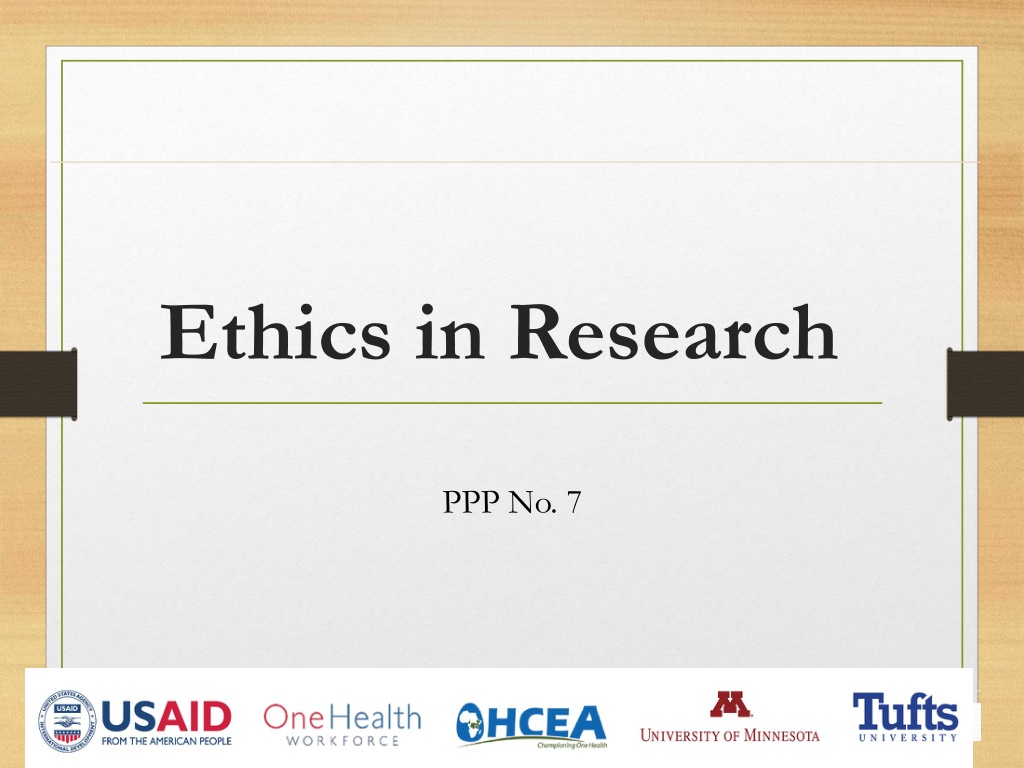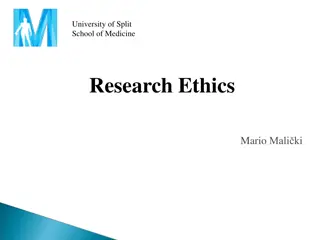Evolution of Ethics in Human Subjects Research
Human Subjects Research (HSR) or Human Subjects Use (HSU) plays a vital role in medical research, with a historical background and strict ethical guidelines in place. From past atrocities to contemporary practices, the use of human subjects has evolved, emphasizing the importance of informed consent and ethical treatment. Key figures and experiments in history have shaped the current ethical standards in research involving human participants.
Download Presentation

Please find below an Image/Link to download the presentation.
The content on the website is provided AS IS for your information and personal use only. It may not be sold, licensed, or shared on other websites without obtaining consent from the author. Download presentation by click this link. If you encounter any issues during the download, it is possible that the publisher has removed the file from their server.
E N D
Presentation Transcript
Ethics in Research PPP No. 7
Human Subjects Research (HSR) or Human Subjects Use (HSU) Involves: Use of human subjects [participants] As Research subjects [participants]
HSR/HSU Important part of medical research People volunteer: Clinical trials of med treatment Basic medical science and biology Social/behavioral (psychological) research
History HRS been treated unethically Hence been put in many places: Requirements Guidelines Processes at national, academic and scientific community levels to ensure similar events not repeated
Definitions Respondents = any object observed for purposes of research In survey research/opinion polls In human-participant research very important: Informed consent: Possible consequences What study is all about Quit any time without adverse repercussions.
Background Human experiments and associated ethics Have evolved over time Part of atrocities strict policies in place today Common subjects: Prisoners Slaves Family members Self-experimentation on occasions, doctors experiment on themselves
Past History Ancient: Herophilos of Chalcedon On prisoners from Ptolemais kings Middle Ages: Systematic experimentation/quantification in physiology Avicerna Ibn Sina an influential Persian Muslim physician: Biomedical res Cl trials RCTs Drug tests On human subjects
Past History 12th Century: Experiments human dissections By Ibn Zuhr, Ibn Tufail, Ibn Jumay Early Modern Times An upsurge in HSR experiments: Vaccine trials in 1700s Self-experimentation Slaves Not informed on dangers associated with such experiments
Past History Outstanding examples: Edward Jenner experiments: Small pox vaccine on his son and neighbourhood children Johann Jorg: Self-experimentation 17 drugs in various doses To test their properties Conversely: Lois Pateur agonised over treating humans
Past History Early 20th Century: 1900s: Accelerated progress of med. Emergence of concept of code of ethics and science discipline Changed dramatically
Past History Early 20th Century: Attitude towards research subjects revolutionarised Examples: Walter Reeds experiments: Develop inoculation to Yellow Fever Experiments carefully scrutinized unlike earlier trials
Past History However contraventions still existed: eg. Tuskegee Study of untreated Syphilis in Negro males (1932-1970) Conducted on subjects without informed consent Covertly and under coercion 1930-1940 British Army: British and Indian soldiers used as guinea pigs Mustard gas effects on Indian and British skin
Past History 2nd World War: Nazi human experiment in German Euthenasia 23 Nazi doctors/scientists tried for murder of concentration inmates (Nuremberg) 15 convicted Result of these trial proceedings Nuremberg Code
Nuremberg Code Informed consent is essential Research should be based on prior animal work Risk should be justified by the anticipated benefits Research must be conducted by qualified scientists Physical/mental suffering must be avoided Research where death or disabling injury is expected should not be conducted
Guidelines towards HSR Code of research ethics: Nuremberg code/principle of 1944 Declaration of Geneva of 1948: By General Assembly of the World Medical Association Physician s dedication to humanitarian goals of medicine Declaration of Helsinki of 1964 Beecher Article of 1966 Belmont Report of 1974: Respect for persons Beneficence Justice Evolution of IRBs
Research Ethics: Definition Branch of philosophy Deals with distinction between: Right and wrong With moral consequences of human actions Informed consent Confidentiality Respect of human rights Scientific integrity
Ethical guidelines in research Proper scientific merits: Potential for benefits Low level of risk Written protocols proper planning of studies Appropriate expertise of investigator Room to stop study whenever necessary Ethics committees ensure standards are met Informed consent voluntary participation Equitable selection of subjects Compensation for research-related injury.
Ethical guidelines (contd) Duties of researcher: Honest Impartial Not to distort the truth Uphold public interest not narrow sectional interests Decline contractual obligations aimed at reaching particular conclusions Decline grants/contracts sponsor retaining right to edit/suppress results
1998 Code of practice Researchers should: Seek truth in good faith Judge own work and that of others impartially Disclose conflicts of interest to ethics review committees Publicly acknowledge all res sponsorship
1998 Code of practice Researchers should: Publish research with scientific merit Refuse requests to withhold results change or tone down the content Ensure sponsors abide with dissemination of results Declare sources of funding
Ethical Principles 3 principles on research involving human subjects (Belmont Report 1974): 1. Respect for persons: Obtain informed consent from res participants Protect participants with impaired decision-making capacity Maintain confidentiality
Ethical principles (2) 2. Principle of beneficence: Research design be scientifically sound Risks of research be within acceptable levels both physical and psycho-social harm
Ethical principles (3) Principle of justice: Benefits and burdens of research be distributed fairly among vulnerable populations e.g. Those with poor access to health care Those with impaired decision-making capacity Residents of nursing homes etc
Responsibilities of investigators Scientific misconduct eg doctoring of data Conflicts of interest eg financial, dual roles - these impair research objectivity Authorship - rush for promotion, prestige and grants RCTs special ethical concerns because treatment often determined by chance/randomly
Responsibilities of investigators Acknowledge use of existing data Genetic research particular ethical concern on confidentiality Payments due to research participants/assistants to levels not exceeding compensation for out-of- pocket expenses, time and effort
Reading Fisher, Jill a. (2007). Governing human subjects research in the USA: Individualized Ethics and structural inequalities. Science & Public Policy 34 (2): 117-126. Ledered, Susan: Subjected to science. Human experimentation in America before the Second World War Baltimore, Maryland: Johns Hopkins University press 1995.

















































